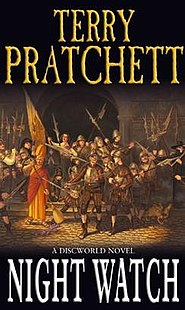Today I want to talk about the Discworld novel Night Watch which features Sam Vimes and the Glorious Revolution of May 25th. I want to talk about it partly because it's one of my favorite Discworld novels in the series, and partly in memory of the anniversary of the Ankh-Morpork revolution and the short-lived Glorious People's Republic of Treacle Mine Road. I think it's in Night Watch that we really get to understand Vimes as a character really well, and get to see a number of events in his youth that shaped him as a copper.
Even though his wife, Sibyl, is expecting their child any day now Sam Vimes simply cannot stop being a policeman. Especially when the Ankh-Morpork Watch gets close to capturing the notorious murder Carcer. Vimes himself manages to corner Carcer in the upper levels of Unseen University's library, but a bolt of lightning sends both men thirty years into the past. With only a mere couple of days before the revolution Vimes must step into the role of his mentor, John Keel, and teach a much younger version of himself how to be a good copper for the sake of Ankh-Morpork's future, and his own.
I think one of the things I really love about Night Watch is seeing how far the Watch has developed over the course of the Discworld novels. At the beginning of Night Watch we see Vimes as not only Commander of the Watch but also the wealthiest man in all of Ankh-Morpork, a far cry from the usually-drunk wreck we met in Guards! Guards!. Even the Watch has gone from being a handful of misfits who didn't belong anywhere else to a respected organization that has trained most of the policemen on the Sto Plains. Just the sheer scope of power available to Vimes in the future makes his lack of resources all the more frustrating of a challenge in the past. I just really liked seeing that Vimes still plenty of police skills he can use on his own, even though in the more recent novels he's been able to rely on capable subordinates like Captain Carrot, and Sergeants Angua, Detritus, and Littlebottom. He may be the leader of a talented and powerful organization, but when push comes to shove Vimes has still got it.
I will admit that this is probably the darkest Discworld book by far and some other reviewers have commented on the lack of obvious jokes. As a result Night Watch makes for a very different reading experience from most other Discworld novels, including some downright dark passages. But does this make Night Watch bad? I say very much no because despite the dark world we live in, Sir Pratchett says that there is ultimately hope. Police don't need to be paragons of virtue but as long as they remain mostly decent people, so long as they follow the proper rules and continue to serve the public trust and protect the innocent, then the system will continue to work.
Another important point Pratchett makes in Night Watch (and it's sort of used in Thud! as well) is that everyone has the potential within them to become a monster. Everyone can realize that the rules of society are completely arbitrary and don't apply to them. However, every day we choose not to give in to temptation. Sure, maybe it's because the punishments outweigh the benefits of doing so, but we can all consciously choose to use the law as a shield to protect us from our inner monster. Yes, even today there are plenty of people who decide the rules don't apply to them, but isn't it more comforting to think that the vast majority of people don't think that way? Maybe it's idealistic but I think it's a good message.
Overall I would definitely recommend you check Night Watch out if you haven't already. Even for people new to the Disc it might be a great introduction to the series. Just keep in mind that its tone is a lot darker than other books in the series. And to all my readers: you may not have much Truth, Justice, or Freedom tomorrow, but maybe, just maybe, you can get a hard-boiled egg.
-Kalpar


No comments:
Post a Comment